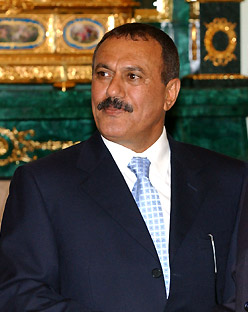Ali Abdullah Saleh

|
| “ | Ruling Yemen is hard. I always say it’s like dancing on the heads of snakes. | „ |
| ~ Ali Abdullah Saleh |
Ali Abdullah Saleh (21 March 1947 – 4 December 2017) was a Yemeni politician who served as the first President of Yemen, from Yemeni unification on 22 May 1990 to his resignation on 25 February 2012, following the Yemeni Revolution. Previously, he had served as President of the Yemen Arab Republic, or North Yemen, from July 1978 to 22 May 1990, after the assassination of President Ahmad al-Ghashmi.
Biography[edit]
Ali Abdullah Saleh was born on 21 March 1947 to a poor family at Bait el-Ahmar village (Red House village) from the Sanhan (سنحان) clan (Sanhan District), whose territories lie some 20 kilometers southeast of the capital, Sana'a. Saleh's father, Abdallah Saleh died when Saleh was still young and after he divorced Ali Abdullah's mother. His mother later remarried to her deceased former husband's brother, Muhammad Saleh, who soon became Saleh's mentor and stepfather.
Saleh received his primary education at Ma'alama village before leaving to join the North Yemeni Armed Forces in 1958 at the age of 11 as an infantry soldier, and was admitted to the North Yemen Military Academy in 1960. Three years later, in 1963, he was commissioned as a second lieutenant in the Armoured Corps. He participated in the Nasserist-inspired Army Coup of 1962, which was instrumental in the removal of King Muhammad al-Badr and the establishment of the Yemen Arab Republic.
During the North Yemen Civil War, he served in the Tank Corps, attaining the rank of major by 1969. He received further training as a staff officer in the Higher Command and staff C Course in Iraq, between 1970 and 1971, and was promoted to lieutenant colonel. He became a full colonel in 1976 and was given command of a mechanized brigade. In 1977, the President of North Yemen, Ahmed bin Hussein al-Ghashmi, appointed him as military governor of Ta'izz.
On 10 August 1978, Saleh ordered the execution of 30 officers who were charged with being part of a conspiracy against his rule. Saleh was promoted to major general in 1980, elected as the secretary-general of the General People's Congress party on 30 August 1982, and re-elected president of the Yemen Arab Republic in 1983.
In the late 1980s, Saleh was under considerable international pressure to permit his country's Jewish citizens to travel freely to places abroad. Passports were eventually issued to them, which facilitated their unrestricted travel.
Ali Abdullah Saleh was a long-time ally of Iraq's Saddam Hussein and supported Hussein's invasion of Kuwait in 1990. After Iraq lost the Gulf War, Yemeni workers were deported from Kuwait by the restored government.
Around 1994, Jihadists from Ayman al-Zawahiri’s Egyptian Islamic Jihad attempted to regroup in Yemen following a harsh crackdown in Egypt. In this, they were tacitly supported by the regime of Ali Abdullah Saleh, as he found them useful in his fight against southern separatists in the war of 1994. After using Islamic militants to repress the separatists and keep the country under his rule, Saleh turned a blind eye to their activities, and allowed their sympathizers to work in his intelligence services.
Saleh developed deeper ties with Western powers, especially the United States, in the War on Terror. Terrorism may have been used and encouraged by Ali Abdullah Saleh to win Western support and for disruptive politically motivated attacks.
In 2011, in the wake of the Arab Spring, which spread across North Africa and the Middle East (including Yemen), Saleh's time in office became more and more untenable until eventually he was ousted as President in 2012. He was succeeded by Abdrabbuh Mansur Hadi.
In May 2015, Saleh openly allied with the Houthis (Ansar Allah) during the Yemeni Civil War, in which a protest movement and subsequent insurgency succeeded in capturing Yemen's capital, Sana'a, causing President Abdrabbuh Mansur Hadi to resign and flee the country.
In December 2017, he declared his withdrawal from his coalition with the Houthis and instead sided with his former enemies – Saudi Arabia, the United Arab Emirates and President Hadi. Accused of treason by the Houthis, he was killed by a Houthi sniper while attempting to flee the capital city of Sana'a, amidst the 2017 battle for the city on 4 December 2017.
On 9 December 2017 he was buried in Sana'a, according to an official. According to a Houthi commander, the burial was held in strict conditions with no more than 20 people attending.
- Important
- Political
- Male
- Military
- Tyrants
- On & Off Villains
- Leader
- Jingoists
- Traitor
- Corrupt Officials
- Deceased
- Evil vs. Evil
- Villains of Yemeni Civil War
- Presidents
- Fallen Heroes
- Arrogant
- Egotist
- Anti - Villain
- Murderer
- Wealthy
- Cowards
- Incriminator
- Hypocrites
- Liars
- Fugitives
- Warlords
- Power Hungry
- Lawful Evil
- War Criminal
- Terrorists
- Grey Zone
- Islam
- Master Manipulator
- Elderly
- Middle Eastern Villains
- Xenophobes
- Anti-LGBT
- Cold war villains
- Villains of the War on Terror
- Government support
- Conspirators
- Pawns
- Anti-Religious
- Posthumous
- Anti-Semitic
- Anti-Christian
- Anti-Catholic
- Remorseful
- Yemen
